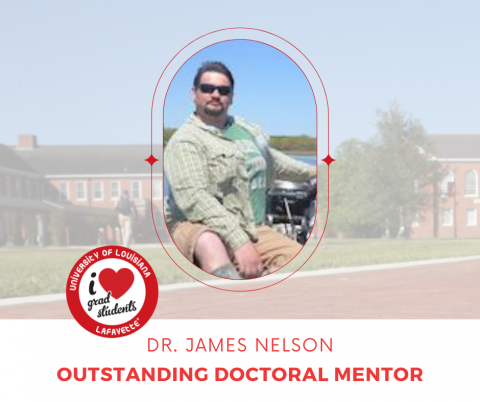Meet Outstanding Doctoral Mentor Dr. James Nelson
Dr. James Nelson is an associate professor in the Department of Biology whose areas of research include marine ecosystem ecology, marine fishes, food webs, and stable isotope analysis. He holds the Fritz Lang Foundation Endowed Professorship in Environmental Biology (BORSF).
Earlier this year, Nelson was honored as an Outstanding Doctoral Mentor by the Office of the Vice President for Research, Innovation, and Economic Development for 2020-2021.
Advancing Skill Sets
Doctoral students in biology at UL Lafayette gain experience at the highest levels of scholarship and career preparation while working on major grants and innovative research.
“Our department has lots of amazing faculty conducting incredible cutting-edge research,” Nelson says.
“Obviously, I am a fish guy and a fan of all my strong marine ecology colleagues, but there are great faculty working on plant genetics, pollination systems, and neurobiology,” he notes.
Nelson has earned numerous recognitions for his research productivity. He received an Early-Career Fellowship from the National Academies of Sciences, Engineering, and Medicine in 2019, and was recognized by the National Science Foundation with a CAREER Award in 2021.
Biology Ph.D. students design, conduct, and analyze research, give scientific presentations, write manuscripts for publication in renowned biology journals, and teach in the classroom.
When guiding students through the program, Nelson takes each individual’s goals into account. “Every student is unique with their own career aspirations and skill sets. I try and tailor their program to fit their needs. Not everyone who gets a Ph.D. wants to (or should) go into academia. I try and find out what they want to be and help them achieve that,” he says.
While many graduates of the program establish careers at academic institutions, others develop careers with governmental and private organizations such as the EPA, the Smithsonian, and NOAA.
“The good thing about doctoral programs is there is time and latitude to develop a project that will make them attractive to their future employers, whether that is a federal or state agency, non-governmental organization, or industry,” Nelson says.
Forging a Path
Beyond preparing for a career, graduate school offers an important opportunity to pursue your interests to their fullest, Nelson says.
“Do the work that excites you. Find out what you like and chase that. Graduate school is hard, but if you are working on a project you are passionate about, you are much more likely to be successful,” Nelson says.
Through the guidance, resources, and support offered by the program, Nelson has seen his students grow and succeed.
“I have had a couple of students publish papers — while in the lab — that was all their idea and do not include me as an author. I am most proud of that because it shows they don't need me anymore,” he notes.
An immense amount of growth happens during a doctoral program, and the ultimate reward is “watching someone become an absolute expert on their topic and the confidence they develop along the way,” Nelson says.
“Anyone who has conducted research knows that feeling of finally getting the answer to your question. There is nothing like it.”
